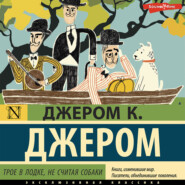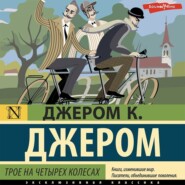По всем вопросам обращайтесь на: info@litportal.ru
(©) 2003-2024.
✖
The Angel and the Author, and Others
Настройки чтения
Размер шрифта
Высота строк
Поля
The spirit of the place steals over you. On entering, with a quarter of an hour to spare, your idea was a cutlet and a glass of claret. In the face of the refreshment-room waiter, the notion appears frivolous, not to say un-English. You order cold beef and pickles, with a pint of bitter in a tankard. To win the British waiter’s approval, you must always order beer in a tankard. The British waiter, in his ideals, is mediæval. There is a Shakespearean touch about a tankard. A soapy potato will, of course, be added. Afterwards a ton of cheese and a basin of rabbit’s food floating in water (the British salad) will be placed before you. You will work steadily through the whole, anticipating the somnolence that will subsequently fall upon you with a certain amount of satisfaction. It will serve to dispel the last lingering regret at the reflection that you will miss your appointment, and suffer thereby serious inconvenience if not positive loss. These things are of the world – the noisy, tiresome world you have left without.
To the English traveller, the foreign waiter in the earlier stages of his career is a burden and a trial. When he is complete – when he really can talk English I rejoice in him. When I object to him is when his English is worse than my French or German, and when he will, for his own educational purposes, insist, nevertheless, that the conversation shall be entirely in English. I would he came to me some other time. I would so much rather make it after dinner or, say, the next morning. I hate giving lessons during meal times.
Besides, to a man with feeble digestion, this sort of thing can lead to trouble. One waiter I met at an hotel in Dijon knew very little English – about as much as a poll parrot. The moment I entered the salle-à-manger he started to his feet.
“Ah! You English!” he cried.
“Well, what about us?” I answered. It was during the period of the Boer War. I took it he was about to denounce the English nation generally. I was looking for something to throw at him.
“You English – you Englishman, yes,” he repeated.
And then I understood he had merely intended a question. I owned up that I was, and accused him in turn of being a Frenchman. He admitted it. Introductions, as it were, thus over, I thought I would order dinner. I ordered it in French. I am not bragging of my French, I never wanted to learn French. Even as a boy, it was more the idea of others than of myself. I learnt as little as possible. But I have learnt enough to live in places where they can’t, or won’t, speak anything else. Left to myself, I could have enjoyed a very satisfactory dinner. I was tired with a long day’s journey, and hungry. They cook well at this hotel. I had been looking forward to my dinner for hours and hours. I had sat down in my imagination to a consommé bisque, sôle au gratin, a poulet sauté, and an omelette au fromage.
Waiterkind in the making
It is wrong to let one’s mind dwell upon carnal delights; I see that now. At the time I was mad about it. The fool would not even listen to me. He had got it into his garlic-sodden brain that all Englishmen live on beef, and nothing but beef. He swept aside all my suggestions as though they had been the prattlings of a foolish child.
“You haf nice biftek. Not at all done. Yes?”
“No, I don’t,” I answered. “I don’t want what the cook of a French provincial hotel calls a biftek. I want something to eat. I want – ” Apparently, he understood neither English nor French.
“Yes, yes,” he interrupted cheerfully, “with pottitoes.”
“With what?” I asked. I thought for the moment he was suggesting potted pigs’ feet in the nearest English he could get to it.
“Pottito,” he repeated; “boil pottito. Yes? And pell hell.”
I felt like telling him to go there; I suppose he meant “pale ale.” It took me about five minutes to get that beefsteak out of his head. By the time I had done it, I did not care what I had for dinner. I took pôt-du-jour and veal. He added, on his own initiative, a thing that looked like a poultice. I did not try the taste of it. He explained it was “plum poodeen.” I fancy he had made it himself.
This fellow is typical; you meet him everywhere abroad. He translates your bill into English for you, calls ten centimes a penny, calculates twelve francs to the pound, and presses a handful of sous affectionately upon you as change for a napoleon.
The cheating waiter is common to all countries, though in Italy and Belgium he flourishes, perhaps, more than elsewhere. But the British waiter, when detected, becomes surly – does not take it nicely. The foreign waiter is amiable about it – bears no malice. He is grieved, maybe, at your language, but that is because he is thinking of you – the possible effect of it upon your future. To try and stop you, he offers you another four sous. The story is told of a Frenchman who, not knowing the legal fare, adopted the plan of doling out pennies to a London cabman one at a time, continuing until the man looked satisfied. Myself, I doubt the story. From what I know of the London cabman, I can see him leaning down still, with out-stretched hand, the horse between the shafts long since dead, the cab chockfull of coppers, and yet no expression of satiety upon his face.
But the story would appear to have crossed the Channel, and to have commended itself to the foreign waiter – especially to the railway refreshment-room waiter. He doles out sous to the traveller, one at a time, with the air of a man who is giving away the savings of a lifetime. If, after five minutes or so, you still appear discontented he goes away quite suddenly. You think he has gone to open another chest of half-pence, but when a quarter of an hour has passed and he does not reappear, you inquire about him amongst the other waiters.
A gloom at once falls upon them. You have spoken of the very thing that has been troubling them. He used to be a waiter here once – one might almost say until quite recently. As to what has become of him – ah! there you have them. If in the course of their chequered career they ever come across him, they will mention to him that you are waiting for him. Meanwhile a stentorian-voiced official is shouting that your train is on the point of leaving. You console yourself with the reflection that it might have been more. It always might have been more; sometimes it is.
His Little Mistakes
A waiter at the Gare du Nord, in Brussels, on one occasion pressed upon me a five-franc piece, a small Turkish coin the value of which was unknown to me, and remains so to this day, a distinctly bad two francs, and from a quarter of a pound to six ounces of centimes, as change for a twenty-franc note, after deducting the price of a cup of coffee. He put it down with the air of one subscribing to a charity. We looked at one another. I suppose I must have conveyed to him the impression of being discontented. He drew a purse from his pocket. The action suggested that, for the purpose of satisfying my inordinate demands, he would be compelled to draw upon his private resources; but it did not move me. Abstracting reluctantly a fifty-centime piece, he added it to the heap upon the table.
I suggested his taking a seat, as at this rate it seemed likely we should be doing business together for some time. I think he gathered I was not a fool. Hitherto he had been judging, I suppose, purely from appearances. But he was not in the least offended.
“Ah!” he cried, with a cheery laugh, “Monsieur comprend!” He swept the whole nonsense back into his bag and gave me the right change. I slipped my arm through his and insisted upon the pleasure of his society, until I had examined each and every coin. He went away chuckling, and told another waiter all about it. They both of them bowed to me as I went out, and wished me a pleasant journey. I left them still chuckling. A British waiter would have been sulky all the afternoon.
The waiter who insists upon mistaking you for the heir of all the Rothschilds used to cost me dear when I was younger. I find the best plan is to take him in hand at the beginning and disillusion him; sweep aside his talk of ’84 Perrier Jouet, followed by a ’79 Château Lafite, and ask him, as man to man, if he can conscientiously recommend the Saint Julien at two-and-six. After that he settles down to his work and talks sense.
The fatherly waiter is sometimes a comfort. You feel that he knows best. Your instinct is to address him as “Uncle.” But you remember yourself in time. When you are dining a lady, however, and wish to appear important, he is apt to be in the way. It seems, somehow, to be his dinner. You have a sense almost of being de trop.
The greatest insult you can offer a waiter is to mistake him for your waiter. You think he is your waiter – there is the bald head, the black side-whiskers, the Roman nose. But your waiter had blue eyes, this man soft hazel. You had forgotten to notice the eyes. You bar his progress and ask him for the red pepper. The haughty contempt with which he regards you is painful to bear. It is as if you had insulted a lady. He appears to be saying the same thing:
“I think you have made a mistake. You are possibly confusing me with somebody else; I have not the honour of your acquaintance.”
How to insult him
I do not wish it to be understood that I am in the habit of insulting ladies, but occasionally I have made an innocent mistake, and have met with some such response. The wrong waiter conveys to me precisely the same feeling of humiliation.
“I will send your waiter to you,” he answers. His tone implies that there are waiters and waiters; some may not mind what class of person they serve: others, though poor, have their self-respect. It is clear to you now why your waiter is keeping away from you; the man is ashamed of being your waiter. He is watching, probably, for an opportunity to approach you when nobody is looking. The other waiter finds him for you. He was hiding behind a screen.
“Table forty-two wants you,” the other tells him. The tone of voice adds:
“If you like to encourage this class of customer that is your business; but don’t ask me to have anything to do with him.”
Even the waiter has his feelings.
CHAPTER XI
The everlasting Newness of Woman
An Oriental visitor was returning from our shores to his native land.
“Well,” asked the youthful diplomatist who had been told off to show him round, as on the deck of the steamer they shook hands, “what do you now think of England?”
“Too much woman,” answered the grave Orientalist, and descended to his cabin.
The young diplomatist returned to the shore thoughtful, and later in the day a few of us discussed the matter in a far-off, dimly-lighted corner of the club smoking-room.
Has the pendulum swung too far the other way? Could there be truth in our Oriental friend’s terse commentary? The eternal feminine! The Western world has been handed over to her. The stranger from Mars or Jupiter would describe us as a hive of women, the sober-clad male being retained apparently on condition of its doing all the hard work and making itself generally useful. Formerly it was the man who wore the fine clothes who went to the shows. To-day it is the woman gorgeously clad for whom the shows are organized. The man dressed in a serviceable and unostentatious, not to say depressing, suit of black accompanies her for the purpose of carrying her cloak and calling her carriage. Among the working classes life, of necessity, remains primitive; the law of the cave is still, with slight modification, the law of the slum. But in upper and middle-class circles the man is now the woman’s servant.
I remember being present while a mother of my acquaintance was instilling into the mind of her little son the advantages of being born a man. A little girl cousin was about to spend a week with him. It was impressed upon him that if she showed a liking for any of his toys, he was at once to give them up to her.
“But why, mamma?” he demanded, evidently surprised.
“Because, my dear, you are a little man.”
Should she break them, he was not to smack her head or kick her – as his instinct might prompt him to do. He was just to say:
“Oh, it is of no consequence at all,” and to look as if he meant it.
Doctor says she is not to be bothered
She was always to choose the game – to have the biggest apple. There was much more of a similar nature. It was all because he was a little man and she was a little woman. At the end he looked up, puzzled:
“But don’t she do anything, ’cos she’s a little girl?”
It was explained to him that she didn’t. By right of being born a little girl she was exempt from all duty.
Woman nowadays is not taking any duty. She objects to housekeeping; she calls it domestic slavery, and feels she was intended for higher things. What higher things she does not condescend to explain. One or two wives of my acquaintance have persuaded their husbands that these higher things are all-important. The home has been given up. In company with other strivers after higher things, they live now in dismal barracks differing but little from a glorified Bloomsbury lodging-house. But they call them “Mansions” or “Courts,” and seem proud of the address. They are not bothered with servants – with housekeeping. The idea of the modern woman is that she is not to be bothered with anything. I remember the words with which one of these ladies announced her departure from her bothering home.

















